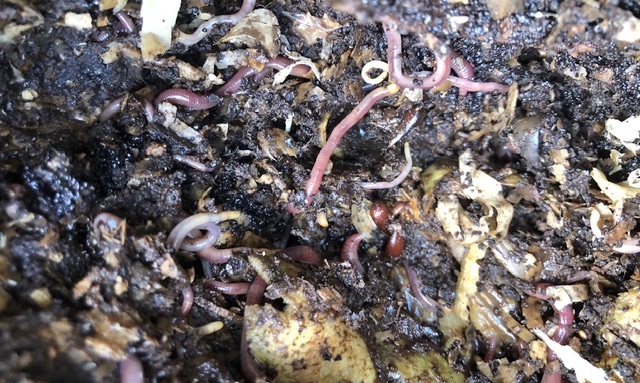
Join in as California celebrates Healthy Soils Week

|
| These red wigglers are working hard, creating the best soil amendment. (Photo: Kathy Morrison) |
If your soil isn't healthy, your plants will have a hard, perhaps even impossible growing life. The California Department of Food and Agriculture , along with UC Agriculture and Natural Resources , are using this week, through Friday, Dec. 10, to point out the importance of healthy soil to our ecosystem.
"Soil is alive with organisms that slowly grow or change depending on what is added, how the soil is used, and environmental conditions," notes Melissa Womack, communications specialist for the statewide UCCE Master Gardener Program. "Soil health, much like our own, is best improved gradually over time so focusing on regular or constant improvement helps achieve and sustain soil health. Adding certain practices into your gardening routine, such as incorporating organic matter, can be a great place to start."
Myriad resources on healthy soil are linked off the UCANR page where Womack's quote appears, including the topics covered throughout Healthy Soils Week.
I think this page, Healthy Soils - Basics , has lots of great information, including a quick quiz to test how much you know about soils. (Master gardener candidates study this intensely, and I still have to look up some of this information.)
Clicking on the For Homes & Gardens tab on that page brings up more specific and very useful information for the home gardeners, covering topics such as:
-- Common home soil problems
-- Practices to improve home soil
-- Soil pH and how to test it
-- Soil texture
-- Amendments
That last topic brings us to composting, which is one of the easiest ways to gradually improve your soil Compost add nutrients and beneficial microbes, holds water and improves plant growth. In fact, by using compost and organic matter, gardeners can reduce plant water needs by as much as 30 percent.
The Sacramento County master gardeners have written an excellent, very clear guide to composting, which you can find here . They also have information, including photos, on this page .
Worm castings, in particular, are almost magical soil amendment. Just spreading it over the surface of your soil, and letting the nutrients percolate down via rainfall or irrigation, will improve the health of your soil in ground or in raised beds -- I can vouch for that. Here's a concise guide to worm composting .
And now I must go feed my hard-working worms.
Comments
0 comments have been posted.Sacramento Digs Gardening to your inbox.
Food in My Back Yard Series
May 6: Maintain soil moisture with mulch for garden success
April 29: What's (already) wrong with my tomato plants?
April 22: Should you stock up on fertilizer? (Yes!)
April 15: Grow culinary herbs in containers
April 8: When to plant summer vegetables
April 1: Don't be fooled by these garden myths
March 25: Fertilizer tips: How to 'feed' your vegetables for healthy growth
March 18: Time to give vegetable seedlings some more space
March 11: Ways to win the fight against weeds
March 4: Potatoes from the garden
Feb. 25: Plant a fruit tree now -- for later
Feb. 18: How to squeeze more food into less space
Feb. 11: When to plant? Consider staggering your transplants
Feb. 4: Starting in seed starting
Sites We Like
Garden Checklist for week of May 11
Make the most of the lower temperatures early in the week. We’ll be back in the 80s by Thursday.
* Plant, plant, plant! It’s prime planting season in the Sacramento area. Time to set out those tomato transplants along with peppers and eggplants. Pinch off any flowers on new transplants to make them concentrate on establishing roots instead of setting premature fruit.
* Direct-seed melons, cucumbers, summer squash, corn, radishes, pumpkins and annual herbs such as basil.
* Harvest cabbage, lettuce, peas and green onions.
* In the flower garden, direct-seed sunflowers, cosmos, salvia, zinnias, marigolds, celosia and asters. (You also can transplant seedlings for many of the same flowers.)
* Plant dahlia tubers.
* Transplant petunias, marigolds and perennial flowers such as astilbe, columbine, coneflowers, coreopsis, dahlias, rudbeckia and verbena.
* Keep an eye out for slugs, snails, earwigs and aphids that want to dine on tender new growth.
* Feed summer bloomers with a balanced fertilizer.
* For continued bloom, cut off spent flowers on roses as well as other flowering plants.
* Add mulch to the garden to maintain moisture. Mulch also cuts down on weeds. But don’t let it mound around the stems or trunks of trees or shrubs. Leave about a 6-inch-to-1-foot circle to avoid crown rot or other problems.
* Remember to weed! Pull those nasties before they set seed.
* Water early in the day and keep seedlings evenly moist.